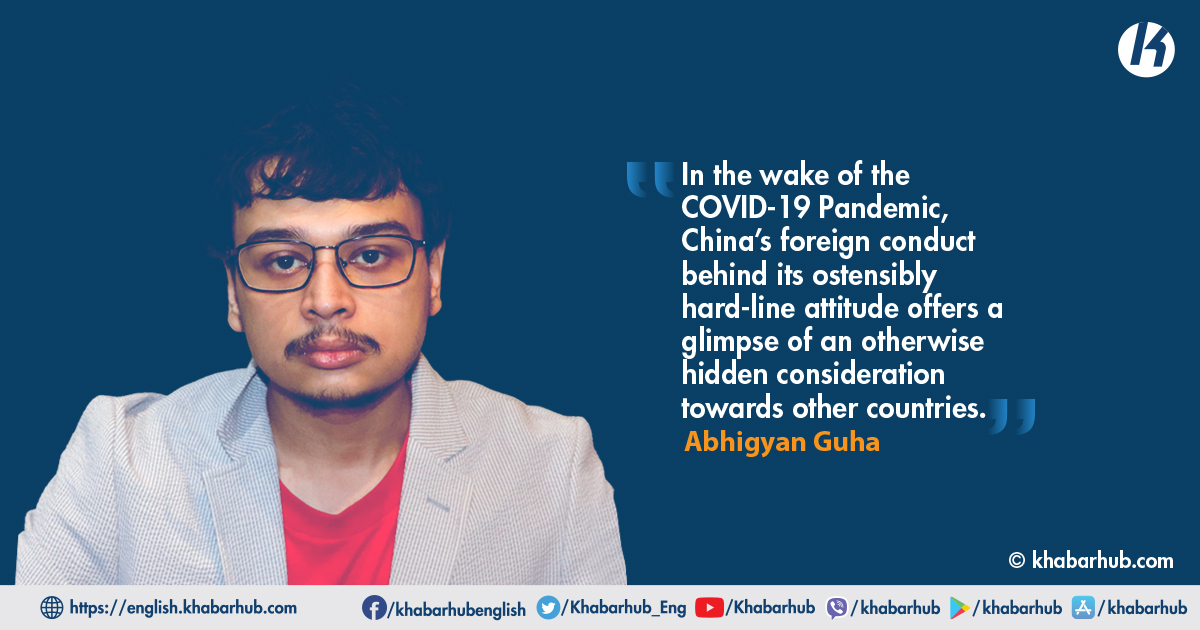Semantically resonating with the 1950 Time Magazine article that summarized a Chinese envoy’s hawkish speech at the United Nations during Mao Zedong’s rule as “two awful hours of rasping vituperation”, the moniker of “Wolf-Warrior Diplomacy” entails the exponentially ultra-nationalistic, stilted and assertive strategic posture and aggressive conduct of the Chinese foreign policy dispensation in the recent years, in China’s quest towards global supremacy.
Signaling a seismic shift from Deng Xiaoping’s soft strategic posture of maintaining a “low profile” to a belligerent foreign policy tactic, a new epoch has ensued in International Relations.
It is essentially propelled by a bombardment of confrontational rhetoric, “Action-Reaction” phenomena, siege-mentality and self-fulfilling prophecy-driven response to negative Western narratives about Chinese domestic and international conundrums.
For instance, Chinese belligerence in the South China Sea and the East China Sea; Chinese gambit on the Korean Peninsula; human rights violations in Hong Kong and Xinjiang province; and unsubstantiated investigations surrounding the origins of the Coronavirus.
A plethora of ballistic Chinese takedowns on international criticism from its diplomatic front has crystallized its global aggressive strategy while drumming up jingoistic sentiment in the state-centric domain at the expense of the ascendancy of messianic personality-cult driven authoritarian image of Xi Jinping, as the vanguard of China’s revival, and the degradation of collective Chinese Communist Party (CCP) leadership.
A feisty cadre of aggressive Chinese diplomats, helmed by Zhao Lijian and Lu Shaye, accoutred with robust economic and cultural tools while hegemonizing cyberspace has subsequently emerged, hell-bent on defending national glory, national interest and sovereignty desperately, even at the cost of supply chain resilience and segmented globalization.
In the wake of the COVID-19 Pandemic, China’s foreign conduct behind its ostensibly hard-line attitude offer a glimpse of an otherwise hidden consideration towards other countries.
Internalizing the inability to extricate themselves from the impediments of a paranoid and secretive political system, the Chinese diplomatic corps have exceedingly been bound by the institutions that were forged through underground revolutionary struggle, maturing at the pinnacle of the Cold War.
It is essentially a system in which trivial threats loom large and where internal and external enemies become constant, wherein there is a constant tension between ontological clarity and political orthodoxy, and it becomes jarring when rubbing up against the outside world.
The combative tactic at the diplomatic front has been a byproduct of the self-declared confidence and fidgety insecurity of the CCP leadership.
The assertive behavior reflects the newfound fortitude following the success of manoeuvering through the 2008 Global Financial Crisis via the triumph of the Beijing Consensus, accompanied by fresh insecurities about regime legitimacy.
Following the long-term stability after the 2011 Arab Spring, the ascendancy of Xi Jinping, with the promulgation of the Belt and Road Initiative (BRI) in 2013, this new approach gained momentum, as Xi moved to ruthlessly suppress dissidents, clamp down on domestic opposition and flout international law.
The current Chinese leadership describes this style of diplomacy as “major-country diplomacy with Chinese characteristics”, in pursuit of the sought-after objectives of the “Two Centenaries” and realizing the “Chinese dream” of “great rejuvenation of the Chinese nation”, while developing favorable external conditions and either walk the path of peaceful development or enjoin actors so as not to concede its legitimate interests or sacrifice its national interest.
The Chinese leadership has historically followed the political path of opening-up and reform, based on the ideology of economic developmentalism, whose necessary internal and external settings would be determined by the CCP.
The diplomacy endorsed by Xi Jinping-leadership entails the co-existence of two contradictory collaborative and coercive approaches.
The former implies expressing China’s wishes to improve, ameliorate and stabilize its foreign relations, strengthening its soft power apparatus, while the latter implies the strong assertion of its own claims concerning national interests, which for instance, in the context of Japan-China relations, entail order in the East China Sea and territorial rights over the disputed Senkaku Islands and strategic actions towards realizing those territorial claims.
In a document outlining the 13th Five Year Plan of China, the term “institutional discourse power” was associated with China’s diplomatic posture, which signifies the expansion of its decisive power to influence world peace, by playing a vociferous role in global governance and the supply of global public goods.
Ramifications in the International Arena
As a result, Wolf-Warrior Diplomacy has stood for increasing China’s institutional voice in global economic governance, building an extensive community of interests, reinforcing China’s voting rights and its rights to propose policies in institutions that shape the international order.
Additionally, it has resulted in expanding China’s footprints through the creation of parallel new global institutions like the BRI and Asian Infrastructure Investment Bank (AIIB) and securing Chinese voice therein.
Further, it implies China spearheading the formation of institutions and organizations that relate to the international status quo in new frontiers like space, ocean floor, internet, or the North and South Poles while securing China’s agenda-setting rights within these institutions.
Key drivers like operational standards and procedures within Chinese bureaucratic machinery and domestic public opinion influence the diplomatic policy-making process, which accords paramount importance to political security and maintenance of the CCP-led one-party system status quo.
China’s tarnished global image, especially from the perspective of human rights and international law, as demonstrated in the Uyghur genocide at Xinjiang, its trade and technological decoupling with the USA, aggressive maneuvers across the Indo-Pacific have been associated with Wolf-Warrior Diplomacy.
In the wake of the COVID-19 Pandemic, China’s foreign conduct behind its ostensibly hard-line attitude offer a glimpse of an otherwise hidden consideration towards other countries.
In this regard, China’s hostile outward stance, albeit superficially, has managed to make overtures by appealing directly to public opinion, and the modus operandi is newer and more diverse.
For instance, it has been reflected in the Huawei technologies controversy and the TikTok case, where the US-China tussle over the sale of algorithms, illustrates the growing dispute over the Chinese share of technological resources in an era of “Splinternet”, that is characterized by cyberspace contestation.
China is intensifying the idea of introducing its own demands and intentions in the existing world order, motivated by its deeply-rooted insecurity, emboldening global trust deficit, and caustic anti-China sentiments.
Subsequently, Public diplomacy worked counterproductively for China, notably in Hong Kong, with its ruthless suppression of pro-democracy elements, as symbolized by the establishment of National Security Law, resulting in the undermining of Taiwan’s faith in the “One country, two systems” principle, inviting severe criticism from the international community.
China’s tarnished global image, especially from the perspective of human rights and international law, as demonstrated in the Uyghur genocide at Xinjiang, its trade and technological decoupling with the USA, aggressive maneuvers across the Indo-Pacific have been associated with Wolf-Warrior Diplomacy.
Although China’s obvious capital and technological capabilities are expanding its digital footprint and social media overseas as a powerful tool for disseminating information across national borders, gaining control over personal and location information, it cannot afford to demand concessions and bargain at the international arena, with a strong anti-China mobilization of the international community.
Contemporary developments like the March 2021 US-China Alaska meetings at Anchorage resulting in stalemate and mutual mudslinging, coinciding with the first summit of the Quadrilateral Security Dialogue (Quad) in the same month, the Chinese Ambassador Li Jiming threatening Bangladesh against hobnobbing with the Quad, demonstrate the repercussions of Wolf-Warrior Diplomacy, as China assumes that its substantive military, economic and diplomatic leverages will limit other nations from crossing the markers it lays down.
(Abhigyan Guha is student of Jadavpur University, India)









Comment